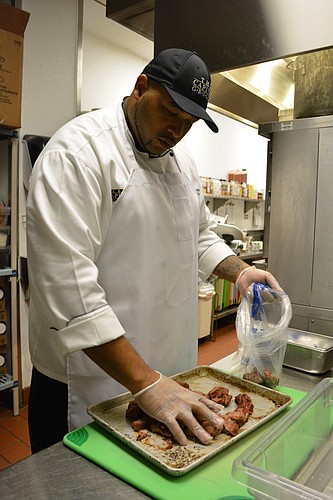- May 6, 2024
-
-
Loading

Loading

With gloved hands, chef Kendell Emmanuel scooped up chunks of freshly cooked steak and bagged it for the freezer.
But that food won’t be available for another of his recipes.
In just a few days, the steak could be on a plate feeding the area’s hungry or homeless.
Each day, Capital Grille hand cuts and marinates steaks, preps fresh vegetables and side dishes and other foods for customers. But if anything goes unused, it’s never wasted.
Rather than throwing the food away, kitchen employees cook up the leftovers, then cool and freeze it for donation to the local Salvation Army.
“This is the first time I’ve worked for a company that does something like this,” Emmanuel said. “It’s an awesome program.”
Since opening at The Mall at University Town Center just more than two years ago, Capital Grille has donated about 15,500 pounds of food — the equivalent of about 13,000 meals — to the Salvation Army, Capital Grille Managing Partner Tim Fanning said.
The Salvation Army picks up frozen food three days a week. Each collection is different. Some days, there are freshly cooked lobster, fillets of steak, chicken or fish with a variety of side items, such as baked potatoes, creamed spinach or dinner rolls.
Fanning said the restaurant doesn’t purposefully create waste, but it sees this “harvest” program as one simple way it can benefit the community.
“It’s a big deal for us,” Fanning said. “We take it very seriously.”
Another restaurant at the mall, Seasons 52, also donates its unused, prepared foods to the Salvation Army. Since opening, it has donated 3,400 pounds of food.
“We want to give back,” Sales and Marketing Manager Sinead Magennis said. “We have a lot of food here, and we don’t want it to go to waste.”
“We really believe that a program like this is unique and positive,” added the restaurant’s managing partner, Alex Elshimy. “It helps us address significant social issues in the community.”
Both restaurants are part of Darden Restaurants, a national chain that owns brands such as Longhorn Steakhouse and Bahama Breeze. The company, overall, encourages its eateries to donate unused food. In the Sarasota/Manatee area, its two Olive Garden restaurants have donated more than 148,000 pounds collectively (restaurants opened in 1986 and 1988). And its two Longhorn Steakhouse locations (Fruitville Road and Gulf Gate, in Sarasota), both of which opened in 2008, have together donated more than 105,703 pounds to the same cause, a company spokesperson said.
Glenda Leonard, development director for Sarasota’s Salvation Army, said local restaurants and food providers, including Yoder’s, Olive Garden, Red Lobster, Chipotle, Cheesecake Factory, Gordon Foods and Whole Foods, among others, contribute about half of the food used by the Sarasota Salvation Army to feed more than 600 meals a day, on average. Food banks provide the other half, for a total of about $2.85 million in in-kind donations each year.
“We get everything from meat to dry goods and pastries,” said Tricia Jarent, the Salvation Army’s food service manager. “Every donation is important. I plan the menu around what we get.”
Leonard agreed.
“We couldn’t do it without the individual restaurants,” she said. “It’s almost like the other lists provide variety and items not available through the food banks. One without the other would not make a very satisfying meal experience.”